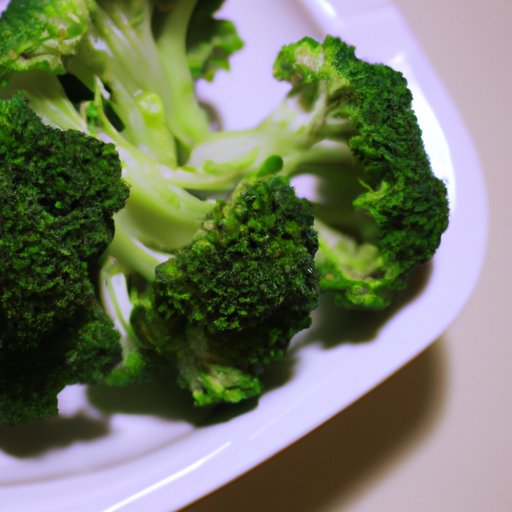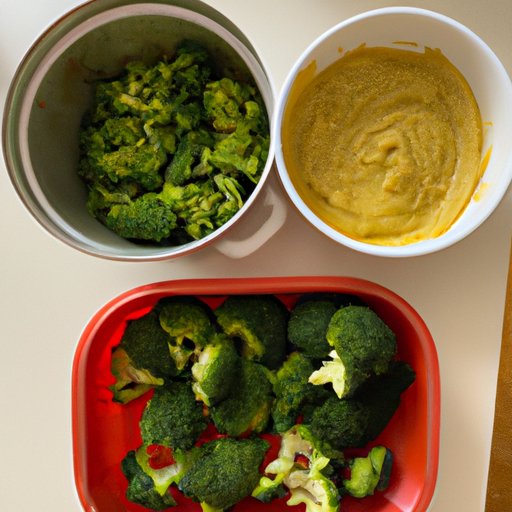Introduction
When it comes to nutritious vegetables, broccoli tops the list. This cruciferous vegetable is packed with essential vitamins and minerals, making it an excellent food choice for people looking to improve their overall health. Let’s take a closer look at the wonders of broccoli and explore how it can benefit your health.
What is Broccoli?
Broccoli is a green, leafy vegetable in the cabbage family. It’s related to cauliflower, Brussels sprouts, kale, and bok choy, although its flavor is much milder than these other vegetables. Broccoli is one of the most popular vegetables in the world and is widely available in grocery stores.
Benefits of Eating Broccoli
Eating broccoli on a regular basis has numerous health benefits. Not only does it provide essential vitamins and minerals, but it is also low in calories and high in fiber, making it a great addition to any weight loss plan. Additionally, broccoli is rich in antioxidants, which may reduce inflammation and protect against certain diseases.

Nutritional Benefits of Eating Broccoli
Broccoli is a nutrient-dense vegetable, meaning it provides a significant amount of vitamins and minerals per calorie. One cup of cooked broccoli contains:
- Vitamin C (135% daily value)
- Vitamin K (116% DV)
- Folate (14% DV)
- Potassium (9% DV)
- Manganese (8% DV)
- Magnesium (6% DV)
In addition to these essential vitamins and minerals, broccoli is also a good source of dietary fiber. One cup of cooked broccoli contains 5 grams of fiber, or 20% of the recommended daily intake. Fiber is important for digestion and helps to keep you feeling full and satisfied after meals.
Finally, broccoli is rich in antioxidants. These compounds are believed to play a role in preventing chronic diseases like cancer and heart disease. In fact, a 2019 study found that consuming broccoli and other cruciferous vegetables was associated with a lower risk of prostate cancer.
How Broccoli Can Help Manage Weight Loss
In addition to its impressive nutrient content, broccoli is also an excellent food choice for those looking to lose weight. Firstly, broccoli is low in calories. One cup of cooked broccoli contains just 31 calories, making it an ideal snack for those watching their waistline. Secondly, broccoli offers a high nutrient density, meaning it provides a significant amount of vitamins and minerals without a lot of calories.
Additionally, research suggests that broccoli may help suppress appetite. A 2018 study found that participants who ate a soup containing broccoli reported feeling more full and satisfied after the meal compared to those who ate a soup without broccoli.

Reasons to Add Broccoli to Your Diet
In addition to helping manage weight, broccoli offers numerous other health benefits. Here are some reasons to add broccoli to your diet:
- Improves digestion: Broccoli is a good source of dietary fiber, which helps to keep your digestive system running smoothly.
- Supports eye health: Broccoli is rich in vitamin A, which is important for maintaining healthy vision.
- Fights inflammation: The antioxidants in broccoli may help reduce inflammation throughout the body.

How to Incorporate Broccoli into Different Meals
Broccoli can be incorporated into a variety of meals and dishes. Here are some ideas for adding broccoli to your diet:
- Roasted: Toss broccoli florets with olive oil, salt, and pepper and roast in the oven until tender and crispy. Serve as a side dish or top with cheese and serve as a main course.
- Steamed: Steam broccoli florets for a few minutes until tender. Serve as a side dish with butter or lemon juice.
- Stir-fried: Sauté broccoli with garlic, ginger, and other vegetables for a flavorful stir-fry. Serve over rice or noodles.
- Raw: Enjoy raw broccoli florets as a crunchy snack. Dip in hummus or your favorite dressing for extra flavor.
The Impact of Eating Broccoli on Lifestyle Diseases
Eating broccoli has been linked to a reduced risk of several lifestyle diseases. Here are some of the health benefits of eating broccoli:
- Heart disease: According to a 2012 study, consuming broccoli may help reduce cholesterol levels, which can help protect against heart disease.
- Diabetes: Research suggests that eating broccoli may help reduce insulin resistance and protect against type 2 diabetes.
- Cancer: Studies have shown that eating broccoli may help reduce the risk of certain types of cancer, such as prostate and breast cancer.
Conclusion
Broccoli is a nutrient-dense vegetable that offers numerous health benefits. It is high in essential vitamins and minerals, low in calories, and rich in fiber and antioxidants. Eating broccoli on a regular basis can help improve digestion, support eye health, reduce inflammation, and even protect against certain lifestyle diseases.
Broccoli can be enjoyed in a variety of ways, from roasted to steamed to raw. Try adding broccoli to your favorite dishes or snacks for an extra boost of nutrition.
Whether you’re looking to lose weight, improve your digestion, or protect against certain diseases, adding broccoli to your diet is a great way to get the vitamins and minerals your body needs. So go ahead and give this wonder vegetable a try!
(Note: Is this article not meeting your expectations? Do you have knowledge or insights to share? Unlock new opportunities and expand your reach by joining our authors team. Click Registration to join us and share your expertise with our readers.)
